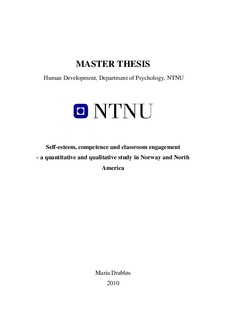Self-esteem, Competence and Classroom Engagement: A Quantitative and Qualitative Study in Norway and North America
Master thesis
Permanent lenke
http://hdl.handle.net/11250/265156Utgivelsesdato
2010Metadata
Vis full innførselSamlinger
Sammendrag
This cross-cultural study explores differences between Norwegian and American 5th-7th graders on self-esteem and school related variables such as academic self-concept (ASC), academic achievement, and classroom engagement. A quantitative survey method was used to access information about these variables. However, a qualitative interview method was also applied to achieve a broader understanding of the student’s perception of and experience with the self-esteem concept and certain feedback situations at school. For the interviews, only a selected part of the 6th graders were participating. The American students scored higher than the Norwegian students on both self-esteem and ASC, and the American teachers rated their students higher on classroom engagement. Interestingly, no significant difference was found on student-rated classroom engagement or actual achievement in the two countries. In defining self-esteem the Norwegian students focused more on “belief in self” despite of others criticism, while the American students focused more strongly on “belief in one’s abilities” and on “feeling good about self”. Throughout the interviews they differed in their concern about “self and others” versus “just self”. Both the quantitative and qualitative results were discussed in light of cultural aspects such as equality, individualism, the "Law of Jante", and the "American Dream". Finally, the self-esteem scores in Norway and America werediscussed in relation to the cultural differences and similarities in the students’ understanding and experience of self-esteem found in the interview analysis.
